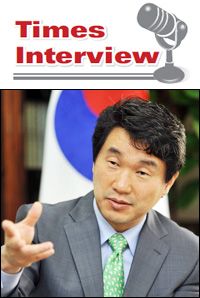Korea to showcase smart learning at APEC forum
Few would argue that Koreans’ zeal for education has been the driving force behind the country’s economic prosperity. Indeed, it has become a case example for many developing countries around the world.
The nation is now seeking to establish a reputation as an educational powerhouse in the digital era by spurring the convergence of technology and education and sharing this knowhow with less-developed nations.
“Smart learning has become the key word for education policymakers seeking new methods of teaching for tech-savvy youngsters. We want to present new solutions that will usher in the era of smart learning at the upcoming APEC forum in Gyeongju,” Korea’s top educator Lee Ju-ho said in an interview with The Korea Times, Monday.
The 5th APEC Education Ministerial Meeting, slated for May 21 to 23 in the ancient capital of the Silla Kingdom (57 B.C.-A.D. 935), will focus on strengthening regional cooperation on various challenges, including the development of human resources and the shift to a technology-based learning environment. It is expected to draw some 500 international guests, including education chiefs of 21 Asia-Pacific Economic Cooperation members, representatives of global institutions and corporate executives.
By hosting the event, Korea seeks to not only enhance the international recognition of Korean education, but also become a global leader spearheading the technology-driven transition, said Lee, minister of education, science and technology.
“On top of the agenda is how to create positive changes in classrooms based on new technologies. The meeting will also be a good opportunity for us to share our educational programs and vision,” the 51-year-old former lawmaker said.
The APEC forum will be a paperless meeting. Participants can check discussion topics and related information through tablet PCs provided by the country’s leading information technology firm Samsung Electronics.
The ministry will also set up a booth besides the conference hall, where visitors can experience various smart learning solutions.
The convergence of technology and education is one of the key objectives for Korean educators.
Under the Smart Education Strategy, the government plans to digitalize hardcopy textbooks, reference books, dictionaries and other teaching materials for elementary schools by 2014. The following year, all middle- and high-school students will take lessons using digital textbooks and online-based materials on computers, smartphones and other digital devices.
It will also set up wireless networks at all schools to create an environment in which teachers and students can access information, anytime and anywhere, and engage in more creative activities.
Ministry officials hope that the digitalization of textbooks will help students enhance their learning efficiency, lower household expenditures on educating children as well as reduce the demand for private tutoring.
“We are working hard to establish the smart learning system for the benefit of students and parents as well. It’s one of the initiatives that we want to share with other participants of the forum,” Lee said. <Korea Times/Na Jeong-ju>






















































